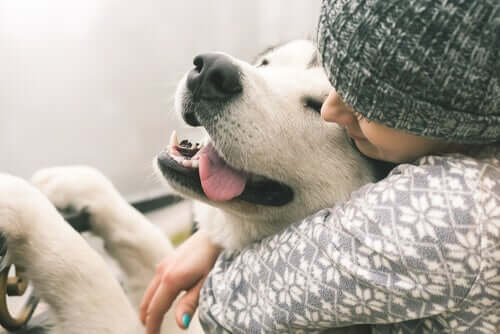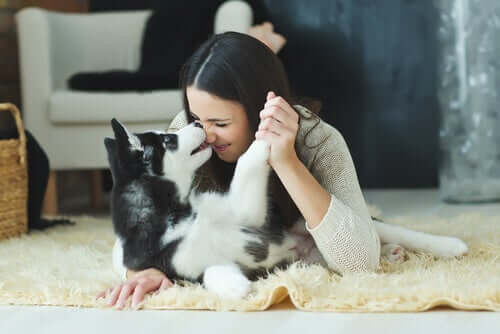Coronavirus and Dog Kisses: Are They Safe?


Written and verified by biochemistry Luz Eduviges Thomas-Romero
Dog kisses have the power to soothe many a wound. It has been proven by science that pets, especially dogs and cats, can help reduce stress, anxiety, and depression. Their company helps people to cope with loneliness, encourages physical activity, and can even help improve cardiovascular health.
Recently, concerns about whether domestic pets can play a role in the spread of COVID-19 have surfaced.
On February 11th the virus was officially named as SARS-Cov-2. The disease caused by this virus is now called “Coronavirus disease 2019” (abbreviated “COVID-19”). In this article, we’ll summarize the information available so far.
Can dog kisses be a COVID-19 contagion risk?
According to the World Organization for Animal Health (OIE), the current spread of COVID-19 is the result of human-to-human transmission. The organization has emphasized that, as of today, there’s still no hard evidence to say that pets can transmit the disease.
Therefore, there’s no real reason for taking measures that may compromise our pets’ welfare. Current evidence suggests that COVID-19’s origin source comes from wild animals, but this is still under investigation.

Was there a positive test report on a dog?
Yes, on March 1st, the authorities reported that a Pomeranian dog in Hong Kong showed a positive test result for COVID-19 and other tests. The pet became ill after its owners fell ill with the coronavirus.
Doctors took samples from the dog’s nose, mouth, and rectum. In addition, they also had its stools analyzed in a laboratory. Only oral and nasal samples tested positive for coronavirus, thus, presenting traces of the virus.
However, doctors insist that it doesn’t necessarily mean the dog was infected. Other samples taken two days later were also positive, although the animal had shown no symptoms. Nevertheless, the experts had the dog in quarantine.

We should mention that the Pomeranian dog has shown no clinical signs of the disease. Veterinarians also performed a blood test on the dog that showed negative. As a result, this is an indication that there are no measurable amounts of antibodies in the blood at this stage.
The OIE states that “there is no evidence that dogs play a role in the spread of this human disease or that they can potentially become ill”.
Regarding the positive test of the Hong Kong dog, the World Veterinary Association of Small Animals (WSAVA) states that “a low amount of COVID-19 viral RNA was present in the samples” and that it is unknown whether these particles are infectious or whether they have no capacity to spread.
Currently, there’s no evidence that pets such as dogs and cats have infected humans with COVID-19; transmission of the virus occurs only from human to human.
According to the World Health Organization, there’s no evidence to suggest that dogs or cats have become ill with this virus or will become a source of infection of COVID-19 in other animals or humans.
Is it advisable to limit contact or dog kisses during isolation?
The OIE suggests you should avoid contact with your pets if you have the virus or you’re susceptible to infection with COVID-19. The Chinese authorities warned infected people not to kiss their pets. In these cases, another household member should take care of the animals.
If the sick person has no choice but to take care of their pet personally, he or she should maintain good hygiene practices and wear a face mask if possible. You can find more information about pet health in the midst of the epidemic on the OIE’s website.

What kind of preventive care do the authorities recommend?
We should note that people infected with COVID-19 should tell their public health point of contact that they have pets or other animals in their homes.
Here are some general recommendations:
- If possible, you should designate a household member to care for pets in the home
- Go for short walks, only to meet physiological needs
- Keep the dog on a leash from the first moment you take it out for a walk
- Always avoid contact with other dogs or people
- Use water bottles with detergent to clean urine and use stool bags
- Without a doubt, officials advice to wash your hands after touching the animals, as their saliva can spread other germs even if coronavirus is not a problem.
Final note
According to the OIE, you don’t need to be afraid of your pets as potential victims or carriers of coronavirus. There’s simply not enough evidence that they can acquire the infection as well. Thus, so far, dog kisses are considered safe as long as you’re not infected with the virus.
The COVID-19 virus appears to be well adapted to spread among people and is therefore unlikely to be transmitted to dogs or cats. So, don’t be afraid to enjoy your dear pet’s company.
Many types of viruses, including the common cold, can’t be transmitted between domestic pets and people. Pets have different cell receptors than humans, which can prevent some human-transmitted viruses from sticking to their system and causing an infection.
In general, viruses are species-specific, as is the case with canine coronaviruses. We hope you found this article useful and that you’ll stay safe!
Dog kisses have the power to soothe many a wound. It has been proven by science that pets, especially dogs and cats, can help reduce stress, anxiety, and depression. Their company helps people to cope with loneliness, encourages physical activity, and can even help improve cardiovascular health.
Recently, concerns about whether domestic pets can play a role in the spread of COVID-19 have surfaced.
On February 11th the virus was officially named as SARS-Cov-2. The disease caused by this virus is now called “Coronavirus disease 2019” (abbreviated “COVID-19”). In this article, we’ll summarize the information available so far.
Can dog kisses be a COVID-19 contagion risk?
According to the World Organization for Animal Health (OIE), the current spread of COVID-19 is the result of human-to-human transmission. The organization has emphasized that, as of today, there’s still no hard evidence to say that pets can transmit the disease.
Therefore, there’s no real reason for taking measures that may compromise our pets’ welfare. Current evidence suggests that COVID-19’s origin source comes from wild animals, but this is still under investigation.

Was there a positive test report on a dog?
Yes, on March 1st, the authorities reported that a Pomeranian dog in Hong Kong showed a positive test result for COVID-19 and other tests. The pet became ill after its owners fell ill with the coronavirus.
Doctors took samples from the dog’s nose, mouth, and rectum. In addition, they also had its stools analyzed in a laboratory. Only oral and nasal samples tested positive for coronavirus, thus, presenting traces of the virus.
However, doctors insist that it doesn’t necessarily mean the dog was infected. Other samples taken two days later were also positive, although the animal had shown no symptoms. Nevertheless, the experts had the dog in quarantine.

We should mention that the Pomeranian dog has shown no clinical signs of the disease. Veterinarians also performed a blood test on the dog that showed negative. As a result, this is an indication that there are no measurable amounts of antibodies in the blood at this stage.
The OIE states that “there is no evidence that dogs play a role in the spread of this human disease or that they can potentially become ill”.
Regarding the positive test of the Hong Kong dog, the World Veterinary Association of Small Animals (WSAVA) states that “a low amount of COVID-19 viral RNA was present in the samples” and that it is unknown whether these particles are infectious or whether they have no capacity to spread.
Currently, there’s no evidence that pets such as dogs and cats have infected humans with COVID-19; transmission of the virus occurs only from human to human.
According to the World Health Organization, there’s no evidence to suggest that dogs or cats have become ill with this virus or will become a source of infection of COVID-19 in other animals or humans.
Is it advisable to limit contact or dog kisses during isolation?
The OIE suggests you should avoid contact with your pets if you have the virus or you’re susceptible to infection with COVID-19. The Chinese authorities warned infected people not to kiss their pets. In these cases, another household member should take care of the animals.
If the sick person has no choice but to take care of their pet personally, he or she should maintain good hygiene practices and wear a face mask if possible. You can find more information about pet health in the midst of the epidemic on the OIE’s website.

What kind of preventive care do the authorities recommend?
We should note that people infected with COVID-19 should tell their public health point of contact that they have pets or other animals in their homes.
Here are some general recommendations:
- If possible, you should designate a household member to care for pets in the home
- Go for short walks, only to meet physiological needs
- Keep the dog on a leash from the first moment you take it out for a walk
- Always avoid contact with other dogs or people
- Use water bottles with detergent to clean urine and use stool bags
- Without a doubt, officials advice to wash your hands after touching the animals, as their saliva can spread other germs even if coronavirus is not a problem.
Final note
According to the OIE, you don’t need to be afraid of your pets as potential victims or carriers of coronavirus. There’s simply not enough evidence that they can acquire the infection as well. Thus, so far, dog kisses are considered safe as long as you’re not infected with the virus.
The COVID-19 virus appears to be well adapted to spread among people and is therefore unlikely to be transmitted to dogs or cats. So, don’t be afraid to enjoy your dear pet’s company.
Many types of viruses, including the common cold, can’t be transmitted between domestic pets and people. Pets have different cell receptors than humans, which can prevent some human-transmitted viruses from sticking to their system and causing an infection.
In general, viruses are species-specific, as is the case with canine coronaviruses. We hope you found this article useful and that you’ll stay safe!
All cited sources were thoroughly reviewed by our team to ensure their quality, reliability, currency, and validity. The bibliography of this article was considered reliable and of academic or scientific accuracy.
- Smith, B. (2012). The’pet effect’: Health related aspects of companion animal ownership. Australian family physician, 41(6), 439.
- Grimm, D. Quarantine the cat? Disinfect the dog? The latest advice about the coronavirus and your pets. Marzo 12, 2020. Science Magazine. https://www.sciencemag.org/news/2020/03/quarantine-cat-disinfect-dog-latest-advice-about-coronavirus-and-your-pets
- Davidson, H. Hong Kong warns residents not to kiss pets after dog contracts coronavirus. Marzo 5, 2020. The Guardian. https://www.theguardian.com/world/2020/mar/05/hong-kong-warns-residents-not-to-kiss-pets-after-dog-contracts-coronavirus
This text is provided for informational purposes only and does not replace consultation with a professional. If in doubt, consult your specialist.








